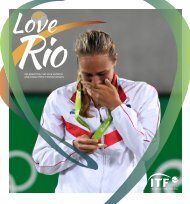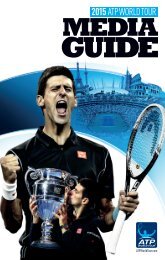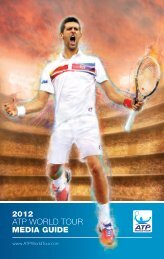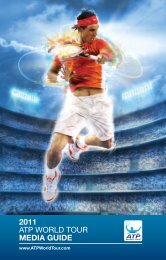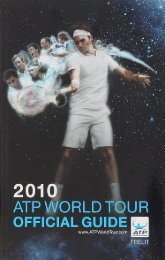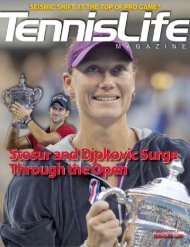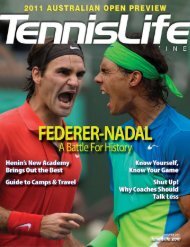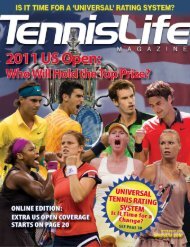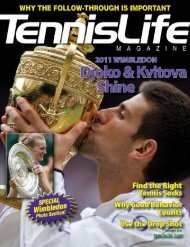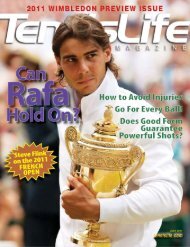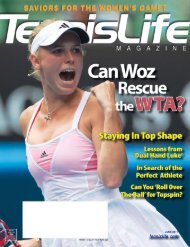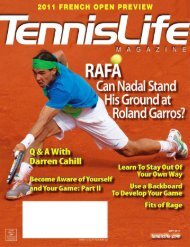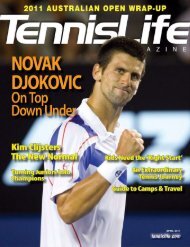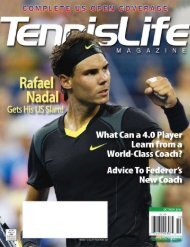A Champion's Mind - Pete Sampras
www.tennismoscow.me Insta:TENNISMOSCOW
www.tennismoscow.me Insta:TENNISMOSCOW
Create successful ePaper yourself
Turn your PDF publications into a flip-book with our unique Google optimized e-Paper software.
Unless you’re very young in your first big final (in which case not having time to think can be a good<br />
thing), you need time to savor and process a victory and get yourself into a proper competitive frame of<br />
mind for your next match. It’s especially true in the late stages of major events, and doubly so in the late<br />
stage of your career, when recovery time is longer. In the final of the 2001 Open, I would be playing<br />
Lleyton Hewitt, a scrappy, fleet, superbly fit Aussie.<br />
It had been a draining second week for me. After beating Rafter and winning that epic four-setter over<br />
Andre, I handled Marat Safin with relative ease. I think he felt the pressure of the situation. Instead of<br />
swinging freely and painting lines, he seemed a little inhibited. I won in straight sets. He was probably<br />
going through the same thing I experienced in the year after I won my first major.<br />
I had to play Hewitt in the final barely twenty-four hours after finishing my semi, and by that point my<br />
brain was already slightly fried and my legs were feeling a little heavy. For a veteran, that twenty-fourhour<br />
turnaround at the Open is one of the toughest assignments in tennis, mentally as well as physically.<br />
Hewitt was just twenty, and he still had peach fuzz on his face. With his long blond hair and clear blue<br />
eyes, he looked like a teenage surfing or skateboarding champ, and he played with a healthy disdain for<br />
etiquette, forever punctuating his better shots—sometimes even errors by opponents—with gut-wrenching<br />
screams of “Come awwwwwwn . . .” A year earlier, I had barely managed to contain Hewitt in the U.S.<br />
Open semis, winning two of my three sets in tiebreakers. He was now a year older, a year wiser, a year<br />
hungrier—and a year stronger.<br />
Arthur Ashe Stadium was playing fast that year, and pundits didn’t recognize the degree to which the<br />
conditions, while good for me, were tailor-made for Lleyton’s game. Although Lleyton was a very<br />
consistent baseliner, he was least dangerous on slow surfaces like clay. He was slightly built and not very<br />
powerful, so he could be roughed up and beaten down in a simple war of the ground strokes and stamina.<br />
Opponents could also attack his serve on slow courts to take control of points. A faster court gave Lleyton<br />
more openings to attack from the backcourt, in classic counterpunching style.<br />
Lleyton returned well enough to be sure of getting a few looks at breaking my serve. At the same time,<br />
being able to hold his own serve by popping in a few aces and making it harder for me to hit forcing<br />
returns would take a little pressure off of him to hold. And he liked to have a target, forcing him to hit<br />
passing shots. My style played right into his strengths.<br />
Lleyton took full advantage of the conditions and played a good first set, taking the tiebreaker 7–4. I<br />
was beat, out of gas, emotionally as well as physically. It quickly turned into a rout in which I won just<br />
two more games the rest of the way. It was my worst loss by far in a major final, and it began the debate<br />
over the state of my game. Some pundits thought I was slowing down. The <strong>Pete</strong> <strong>Sampras</strong> they watched in<br />
the U.S. Open final against Hewitt looked like a tired, vulnerable tennis player, at a loss for a strategy to<br />
employ against his bright-eyed, bushy-tailed, not-yet-twenty-one challenger. It was an accurate<br />
assessment, but it was more of a comment on the tournament I’d had than my general physical state.<br />
I didn’t look tired because I was old, or losing focus, or banged up. I looked tired because it had been<br />
an ultrademanding week filled with very tough opponents and a back-to-back semi and final. I didn’t<br />
exactly feel slow out there during the Hewitt match, but I felt like I was having to work awfully hard for<br />
the points that I won. I struggled and heaved and tried to dig into my reserves, but there was too little left<br />
to call upon.



